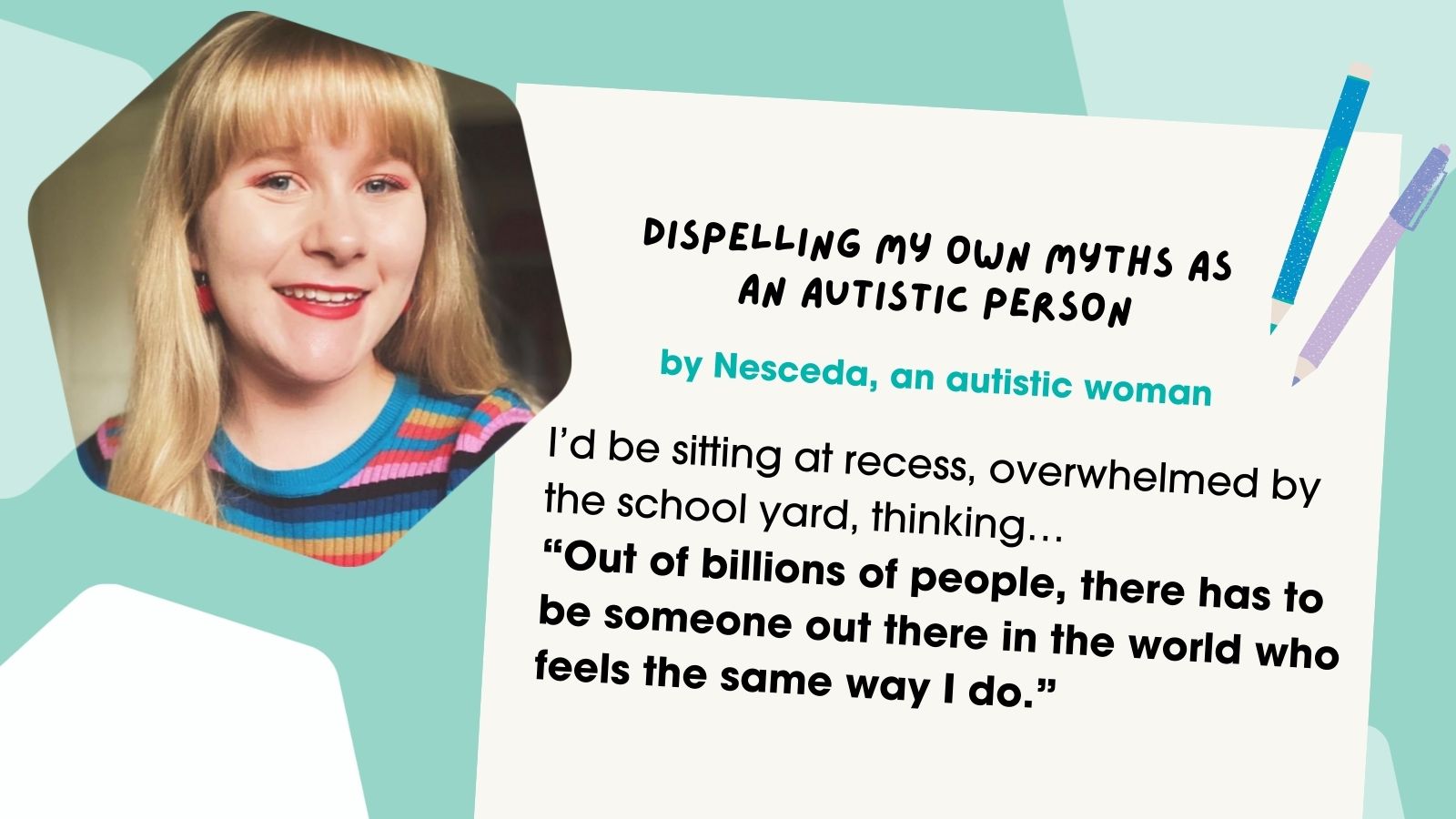Dispelling my own myths as an Autistic person
Posted on

When I was a kid, I used to feel so disconnected from the neurotypical world. A world that I now realise, was not designed for the neurodivergent brain. I’d be sitting at recess, overwhelmed by the school yard, thinking… “Out of billions of people, there has to be someone out there in the world who feels the same way I do.” I wondered if I would meet someone who shares my name, my confusion and disinterest in the game ‘tiggy’ (like seriously, what is the point?), or my interest in reading the dictionary.
Let me bring you up to speed…Hi. I’m Nesceda. I’m an Autistic woman, working on Wurundjeri land as an Autism Connect Advisor for Amaze, and an independent producer of comedy and cabaret shows. Oh, and I also make pompoms – but that’s kind of irrelevant.
I am proud to be Autistic. I feel fortunate that I was aware of my identity from a young age, but I haven’t fully understood my identity until adulthood. However, I must begin this by saying that as a white woman from middle-class Australia, with access to early diagnosis, I come from a place of privilege where my environment and connections have encouraged me to feel proud without fear. It is important that we amplify the voices of those from all different backgrounds to truly understand and support our community.
Functioning labels — I am not a fire danger rating, nor am I salsa!
A diagnosis of Asperger’s at age 3 made things make sense for my family. Even as an Autistic person, I thought that the spectrum was linear. I think we all thought that at some stage. Well guess what? There’s no ‘mild’ or ‘severe’ Autism…shock horror! ‘Severe’ should be reserved for fire danger warnings, and ‘mild’ should only refer to salsa! Autism is in fact just as diverse as our world is. Yes, we all share characteristics to varying degrees, but Autism is not quantifiable. There are strengths and challenges and obstacles and excitements that come with being Autistic. Yeah, I can and have achieved things, but it’s not in spite of Autism – it’s because of it. On the flip side, if you say someone’s “severe”… that sounds awful! You are discounting and undermining a person’s capabilities. So as a general rule of thumb… don’t use functioning labels.
Everything I do is Autistic because, newsflash, I am Autistic.
I could only understand this saying once I embraced Autism as my identity. I realised that using person-first language was not beneficial for me, and created a disconnect from my Autistic identity. Once I learned that Asperger’s was an ‘autism spectrum disorder’ (big ‘ew’ to the word ‘disorder’), I thought that saying ‘person on the spectrum’ was better, as it acknowledged a wider experience of autism to not play into stereotypes. Now that I think about it, using that language still made me feel separated from the community. I have now adopted identity-first language after starting work at Amaze, and I feel far more comfortable with that.*
*I will note, the language that an autistic person uses to refer to themselves is completely up to them. Please respect a person’s preferences in the same way you’d respect their pronouns. You’re talking about their identity here.
Over time, masks wear thin. Be kind.
I didn’t understand what masking was and found out that I’d been doing it for most of my life. I’m still working on safely unmasking after doing it religiously for 18 years. As a result of excessive masking, I have had ‘panic attacks’ after being in situations of high sensory input and social discomfort. These were never panic attacks, but rather, meltdowns. I only realised the frequency and triggers of my meltdowns and sensory overload during isolation in 2020. I thought I was more sensitive. In truth, the time away from overwhelming situations made me more aware of my sensory overload in day-to-day life. The supermarket has always had the fluorescent brightness, the dull hum of fridges, the squeaky floors, the cacophony of sounds, and the lack of personal space. I’ve since found strategies to regulate myself.
The Autistic connection is strong!
One thing I did know, amongst all the internalised ableism, is everyone’s Autistic experience is so wildly different, that it can be difficult to identify with others. But what I have learned is that simply by being Autistic, diagnosed, self-identifying, or unaware, we share a connection that is so unique and special. Autism is not my superpower, it’s my life. There are strengths and challenges, but I’m not going to change myself for anyone anymore. And no, there may not be anyone out there with my same name, a distaste for ‘tiggy’ and a love for the dictionary, but there sure are plenty of Autistics!
I’ve only learned all of this through connection with the Autistic community. From there, I had the confidence to seek support, and contribute to the disability sector in my work as an Autism Connect Advisor. The Autistic community taught me about the importance of embracing neurodiversity, and my wish is that the world will see Autistic people for who we are without trying to change us. We must encourage the world to listen to Autistic voices, particularly when it comes to talking about our lives and identities. Autistic people are the experts on Autistic people, after all.
I’m so grateful to be working as an Autism Connect Advisor with other Autistic people, and have learned so about myself from this role. Every day, I hope that an Autistic person’s world becomes just that bit easier to navigate, through the work that we do. I’m so excited to continue helping our community.
Autism Connect
Free, independent autism information you can trust.
Phone: 1300 308 699
Webchat: Click the Live Chat icon on this screen at the bottom right.
Open from 8am to 7pm, Monday to Friday.